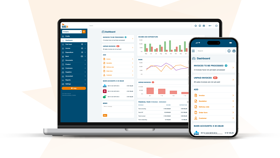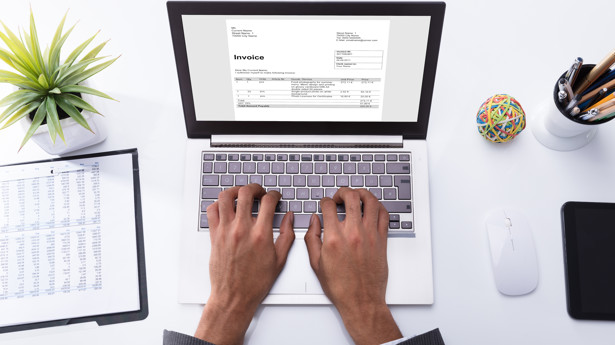-
Better overview
From invoices and purchase orders to bank statements: when your administration is only or mainly on paper, it can be a tedious task to compile reports or find specific information.
If you as a business owner opt for digital accounting and invoicing software, you will have a central access point with all the information. Otherwise, you will have to search for documents on various platforms in different file formats (PDF, xlsx, docx, etc.).
Moreover, you can link your invoicing software to your online banking system, webshop(s), CRM software, etc. This ensures that you have a 360-degree overview and can make decisions based on directly available real-time data.
-
Time-saving
Invoicing software lets you perform recurring tasks faster or even automate them completely.
Such tasks include receiving invoices, preparing and sending invoices, checking payments, sending payment reminders and generating reports. At the quarter-end, you can easily forward your invoicing and administration to your accountant by linking to their accounting software.
This stops you wasting time doing things manually, allowing you to concentrate on more critical tasks. And saving time means higher productivity and lower costs.
-
Reduced risk of errors
Digital accounting involves electronic processes. The links allow the information to be automatically loaded into your invoices, purchase orders, delivery notes, etc., within your invoicing software, without having a parallel administration. So no more cutting, pasting or re-entering digital data,
which reduces the risk of errors. Moreover, payment errors are a thing of the past, as you no longer have to enter amounts or account numbers.
-
Available 24/7, wherever you are
Switching to digital accounting and invoicing software will facilitate remote working. With all accounting information and tools accessible everywhere, you don't need to have everyone together in the same place. Digital accounting is accessible whenever and wherever you want it –
all you need is an internet connection and a device.
Occasionally, different departments or employees require access to accounting information. Digital accounting allows you to make the information available to anyone who needs it, when and where it is required. This improves transparency and cooperation.
And if necessary, you can always include restrictions to shield information.
-
Secure
Managing your administration and invoicing online (and not on your server or computer) will prevent you from losing your data due to fire, theft, a crashed computer or carelessness. Automatic backups also eliminate the need to have a server or storage capacity, saving you space.
The online invoicing software runs on several large servers where your data is safely stored.
You do not have to update an online platform manually, as it’s all done automatically. What’s more, you don’t need to buy and install new versions of your invoicing software every two years.
Finally, online invoicing platforms such as Billit let you send files securely via PEPPOL (Pan-European Public Procurement Online).
This is a secure network co-funded by the European Commission and 18 government agencies.






